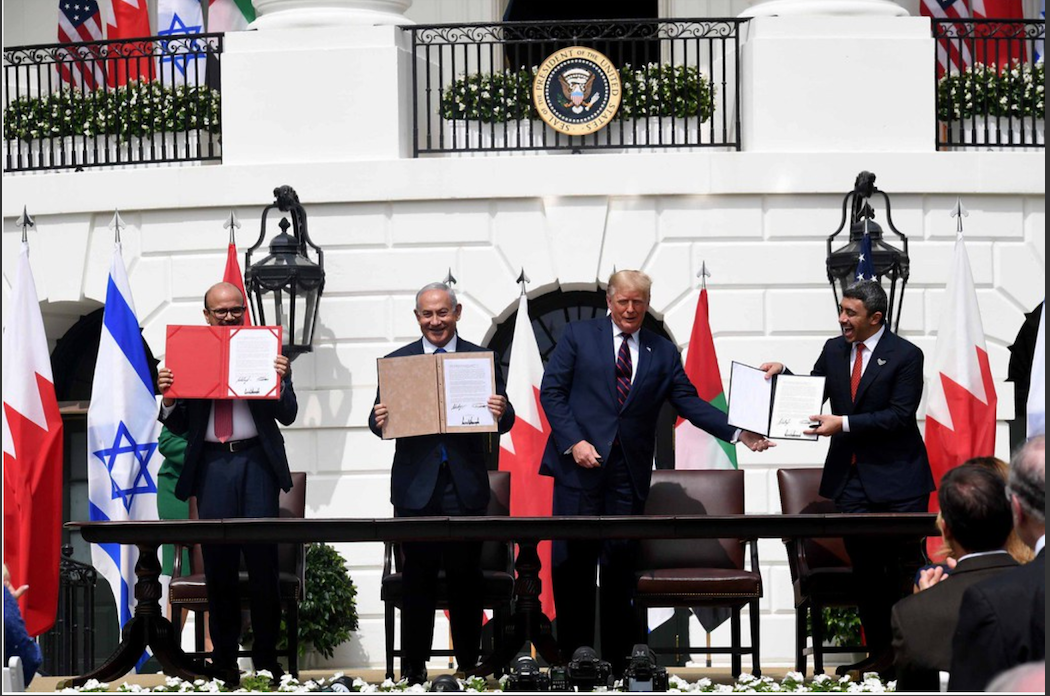When the United Arab Emirates and Bahrain announced that they were opening diplomatic ties with Israel, the first thing that came to mind was how massive this landmark deal is. The twin announcements doubled the number of Arab countries that recognize Israel’s legitimacy as a country and opened a path for other wealthy Gulf states to follow. The financial opportunities for a country as tech-rich as Israel are unimaginable and the ability to form a block against Iran is paramount to Israel’s future.
The second thing that came to mind was how potential Israeli deals with the UAE and Bahrain would impact peace in the region. Neither country was actively at war with Israel, just the opposite, in fact; they had been cozying up to each other in the face of Iranian pressure. But the sway the oil rich nations’ hold is immense and they could act as a bellwether for the future actions of the regional giant, Saudi Arabia. It is unlikely both Arab nations would risk upsetting their biggest and most important neighbor by openly befriending Israel, hinting at the Saudi’s tacit support for the movement.
Saudi support is important, not just because of its size and monetary influence, but also because of country’s role in terrorism. Saudi Arabia is one of the largest financiers and exporters of Wahhabism, an extremist sect of Islam that is responsible for much of the religious terror campaigns across the world.
In this sense, normalization is a momentous occasion–a step away from the peak of Islamic terror in the early ‘90s and 2000s and towards a peaceful Middle East.
Another facet of regional peace is the two blocks of Islam that are currently vying for power, the Iranian-led Shia Muslims and the Saudi-led Sunni Muslims. The two blocks are diametrically opposed to one another, engaged in a regional cold war that has played out in proxy wars in Syria, Iraq, and Yemen.
Israel’s role in the conflict is largely that of an enemy of my enemy, as Iran, on the verge of becoming a full-blown nuclear power, is a much bigger threat to the safety and dominance of the Saudi’s than is accepting Israel. Taking that into account, the formal alignment of the Gulf nations with Israel makes sense, functioning similarly to how the creation of NATO acted to oppose the Soviet bloc. It is a move that might create an uncomfortable peace, but peace nonetheless.
Finally there is the matter of peace with Palestine, the core conflict of the region and the one most negatively affected by recent developments. As a block, Arab nations have refused to legitimize Israel unless they agree to a two-state agreement that would bring Palestine back from the brink. It has been a cornerstone of diplomatic strategy since the establishment of the Jewish state, one that the UAE and Bahrain have now cast aside.
The only concession they received from Israel was a pause on settlement building and annexation of the West Bank, which, according to the Israeli finance minister, was already frozen before the deal was struck. The UAE has pushed back on this, saying it is a permanent stop to the annexation, but only time will tell.
And while that is undoubtedly a fantastic haul for Israel, it is disastrous for Palestinians. Two of the wealthiest Gulf countries have given up the leverage they had and earned nothing for a two-state solution. This can be seen as the beginning of the end for the homogenous support they have received for decades.
Peace, then, might be further away than it was before the normalization. Palestinians that were raised to believe that the Arab world stood with them are going to feel abandoned, opening the door for radicalization from Palestinian nationalist groups and Iranian-backed Islamic extremists who no longer have to compete with Saudi groups.
Whether this is a good deal or a bad one for Israel rests on what you believe is most important for the country to work towards: Legitimacy from the Arab world and creating a bulwark against Iran or a peaceful end to the Palestine conflict, be it a two-state or one-state solution.

